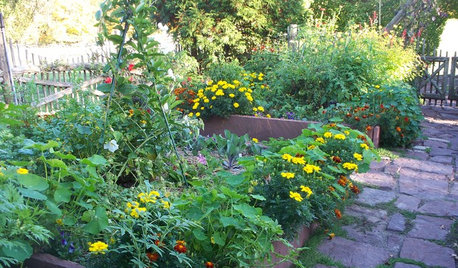Organic disease control methods?
Scott F Smith
18 years ago
Related Stories

GARDENING GUIDESTree Care: Common Tree Diseases and What to Do About Them
Learn to recognize trees that may be affected by diseases or pests so you can quickly take action
Full Story
KIDS’ SPACESControl Kid Stuff the Sane Way — Artwork-Managing Strategies
Enlist your child's help in managing creative piles to set the stage for good habits and make organizing easier on you
Full Story
HEALTHY HOMEWhat to Know About Controlling Dust During Remodeling
You can't eliminate dust during construction, but there are ways to contain and remove as much of it as possible
Full Story
ORGANIZINGOrganizing Secrets: It’s the Little Things
Get these 8 small areas under control for a major boost in overall tidiness at home
Full Story
ORGANIZINGYour Total Home Organizing and Decluttering Guide
Take it slow or be a speed demon — this room-by-room approach to organizing and storage will get your home in shape no matter how you roll
Full Story
GARDENING GUIDESHow to Switch to an Organic Landscape Plan
Ditch the chemicals for a naturally beautiful lawn and garden, using living fertilizers and other nontoxic treatments
Full Story
GARDENING AND LANDSCAPING4 Good Ways to Get Rid of Mosquitos in Your Yard
Stay safe from West Nile virus and put an end to irksome itches with these tools and methods for a porch, patio or yard
Full Story
LIFE6 Ways to Cool Off Without Air Conditioning
These methods can reduce temperatures in the home and save on energy bills
Full Story
GARDENING GUIDESOrganic Matters: Thwart Insect Pests With Trap Crops
Add a few sacrificial plants to your garden to lure insects away from the harvest
Full Story
KITCHEN DESIGN8 Kitchen Organizing Ideas for Messy Cooks
Not the clean-as-you-go type? Not to worry. These strategies will help keep your kitchen looking tidy no matter what your cooking style is
Full Story





carolyn137
Scott F SmithOriginal Author
Related Professionals
Folsom Landscape Architects & Landscape Designers · Redondo Beach Landscape Architects & Landscape Designers · Frisco Landscape Contractors · Goodyear Landscape Contractors · Canyon Lake Landscape Contractors · Danvers Landscape Contractors · Duarte Landscape Contractors · Plymouth Landscape Contractors · Salem Landscape Contractors · St. Louis Landscape Contractors · Thornton Landscape Contractors · View Park-Windsor Hills Landscape Contractors · Wethersfield Landscape Contractors · Norridge Landscape Contractors · St. Louis Siding & Exteriorsfarkee
carolyn137
thandiwe2
farkee
culdeus
Scott F SmithOriginal Author
culdeus
farkee
marymd7
farkee
Scott F SmithOriginal Author
farkee
sic_transit_gloria
zolablue
southgeorgia_girl
evannyangel
novice_2009